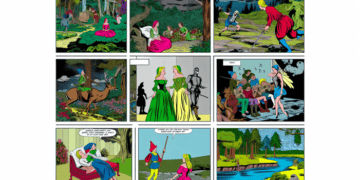Trivia for seniors is more than a way to pass time. It keeps the mind active, builds friendships, and adds fun to the day. Think of a group sharing laughter and memories, where each right answer brings a warm sense of pride. That’s what trivia for seniors offers.
It draws on a lifetime of knowledge, from history people lived through to classic movies they watched and songs they loved. It isn’t a dry quiz. It’s a lively brain workout, much like gentle exercise for the body. It also invites storytelling. A simple question often leads to personal stories, turning a game into a shared experience full of memories.
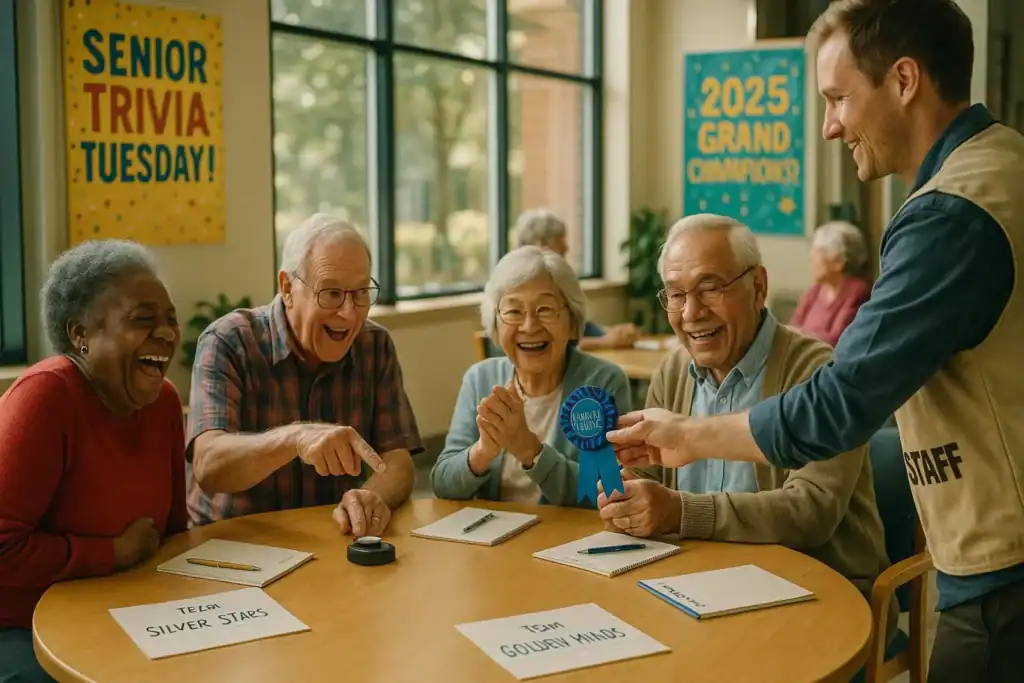
Why Trivia Improves Cognitive and Emotional Health in Seniors
Trivia supports both thinking and mood in older adults. It offers a light challenge, brings people together, and encourages a sense of purpose and ongoing learning.
Mental Stimulation and Memory Support
“Use it or lose it” fits brain health well. Trivia gives steady mental activity, which is important for keeping thinking skills and may help slow decline. Each question is a small challenge that asks people to recall facts, solve problems, and think quickly. This regular practice can improve memory and mental sharpness over time.
Pulling facts from long-term memory, even when it feels hard, strengthens those brain connections. It works like a gentle workout for the brain, keeping it quick and responsive. Remembering a name or detail also feels good, which encourages people to keep playing and boosts confidence.
Social Interaction and Connection
Trivia is great for building social ties. It is usually played in groups, which creates a friendly space for conversation and light competition. This is especially helpful for easing loneliness, which can harm mental health.
Players do more than answer questions. They laugh, talk through choices, and reminisce. This shared time builds trust and friendship. Team play also supports communication and kindness, so everyone feels welcome and valued.
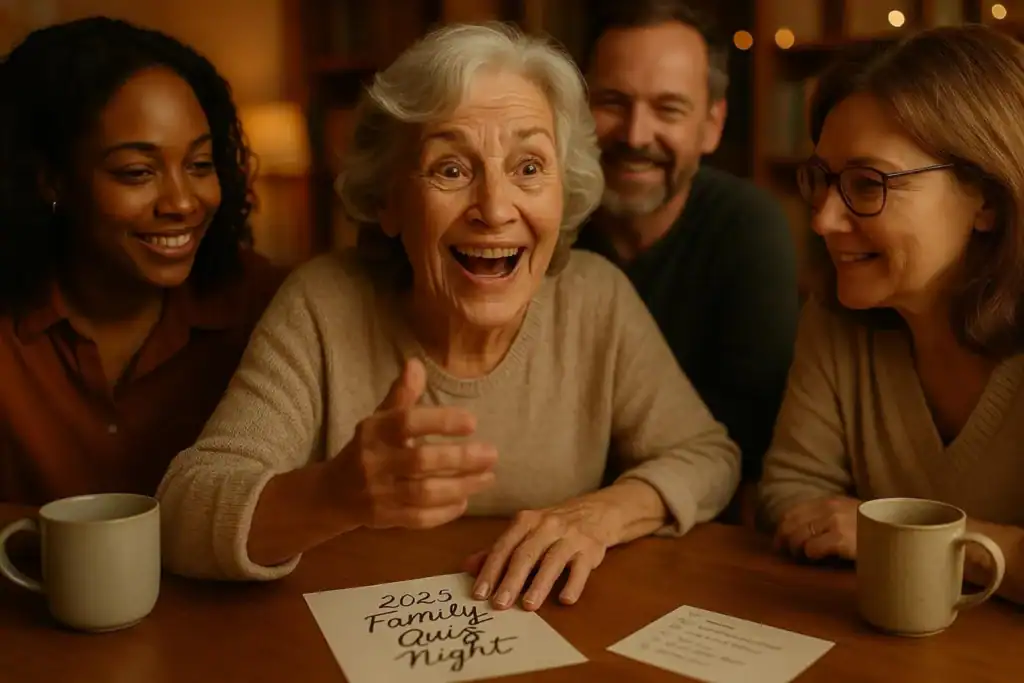
Building Confidence and Lifelong Learning
Getting a trivia answer right, alone or with a team, can lift confidence. It confirms what someone knows and shows their thinking is still strong.
Trivia also keeps curiosity alive. With many topics, players learn new facts and ideas that keep their minds interested. This steady learning grows their knowledge and adds purpose. There is always something new to learn and enjoy at any age.
What Are the Benefits of Trivia Games for Seniors?
Beyond the fun, trivia offers many benefits that can improve daily life for seniors. It supports thinking skills, social ties, and emotional well-being, making it a well-rounded activity.
Supports Brain Health and Delays Cognitive Decline
The brain does well with regular activity, and trivia is a great way to provide it. Playing often works many mental skills, like memory, attention, and problem-solving. This steady practice can help keep the mind sharp and may help delay the start or progress of decline. It’s a friendly way to keep brain pathways active and healthy as we age.
Remembering facts, dates, and names across topics challenges the brain in different ways and prevents mental slowdown. Searching for an answer, even when it doesn’t come right away, builds thinking and recall skills over time.
Encourages Socialization and Reduces Loneliness
Loneliness is a common issue for many seniors. Group trivia helps with that. It offers a relaxed, structured way to spend time with peers, family, and caregivers. Talking through questions and celebrating correct answers invites easy conversation and creates bonds.
This social time supports emotional health, eases isolation, and builds a sense of belonging. People connect with others who share similar memories and interests, forming friendships and a caring community. The smiles and friendly teasing that come with trivia lift spirits and improve mood.
Provides Entertainment and Nostalgia
Trivia is also pure entertainment. Many questions point to times seniors remember well, which brings back great memories and happy feelings. Topics like classic films, music, major events, or pop culture from their youth can feel especially good.
This trip down memory lane is pleasant and can also be healing. It ties people to their past and reminds them of important moments. Trivia adds a spark to routine, making room for fun, learning, and fond memories each day.
What Trivia Categories Are Most Popular with Seniors?
When planning trivia for seniors, pick categories that match their experiences and interests. Familiar topics build confidence and invite more people to join in.
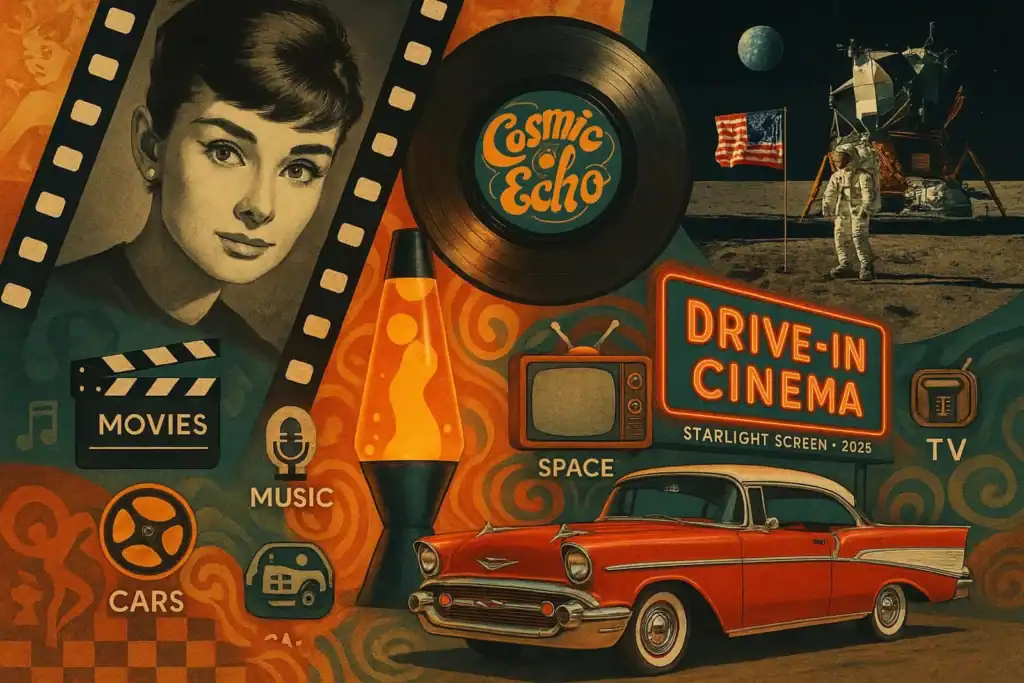
Decades-Based Trivia: 1940s, 1950s, 1960s, 1970s
Decade-based questions are often favorites, especially the 1940s through the 1970s. These years hold personal memories and big cultural changes. Questions might cover major events like the end of World War II or lighter topics like the debut of the Barbie Doll in 1959.
Sample questions include: “What year did the United States join World War II?” (Answer: 1941) or “Which classic board game about solving a crime committed at a mansion was introduced in 1949?” (Answer: Clue). In the 1950s, try “Who was the host of the 1950s variety show The Ed Sullivan Show?” (Answer: Ed Sullivan). For the 1960s: “What iconic hairstyle became popular in the 1960s, often associated with the band The Beatles?” (Answer: The Mop Top) and “What 1969 music festival is often considered the defining moment of the counterculture movement?” (Answer: Woodstock). For the 1970s: “Which band released the album ‘Rumours’ in 1977?” (Answer: Fleetwood Mac) and “Which 1975 film directed by Steven Spielberg is considered the first major summer blockbuster?” (Answer: Jaws). These prompts invite stories and memories from those times.
Classic Movies and Television
Old Hollywood and early TV are dear to many seniors. Trivia about classic films and shows is always popular. Think of famous lines, actors, and beloved series. Examples: “What famous line is spoken by Humphrey Bogart’s character to Ingrid Bergman’s character in Casablanca?” (Answer: “Here’s looking at you, kid.”) and “What TV series featured the fictional town of Mayberry?” (Answer: The Andy Griffith Show).
Other questions: “Who played the role of Atticus Finch in the 1962 film To Kill a Mockingbird?” (Answer: Gregory Peck) and “Which 1960s TV show featured a talking horse?” (Answer: Mister Ed). Talking about these favorites often leads to lively chats about personal picks and shared memories.
Music and Famous Musicians
Music often triggers strong memories. Trivia about past hits, singers, and bands gets people tapping their feet. “Who was known as ‘The King of Rock and Roll?'” (Answer: Elvis Presley) and “Which band is famous for the song ‘Hey Jude?'” (Answer: The Beatles) are classics.
You can also go into artists: “Who was the lead singer of The Rolling Stones in the 1960s?” (Answer: Mick Jagger) and “Who first sang the song ‘Stand By Me,’ in 1961?” (Answer: Ben E. King). These questions often lead to sing-alongs and stories about dances, concerts, and favorite songs.
Pop Culture and Historical Events
Mix fun pop culture with major events for a balanced game. Include toys, fashion, science milestones, and world news. Examples: “What famous toy was introduced in 1959 and became a cultural icon?” (Answer: Barbie Doll) and “What was the name of the first artificial satellite launched by the United States in 1958?” (Answer: Explorer 1).
You can also cover the Civil Rights Movement, space flight, and political change. For instance: “What major event took place in Washington D.C. on August 28, 1963?” (Answer: The March on Washington). This mix appeals to many interests and knowledge levels.
Science, Nature, and Geography
While not always tied to nostalgia, science and nature can still draw interest. These topics fit general knowledge and can be kept simple. Examples: “What is the chemical symbol for the element gold?” (Answer: Au) and “Which planet has the most moons in our solar system?” (Answer: Saturn).
Nature questions like “What is the largest living species of bird?” (Answer: Ostrich) and “What is the largest ocean on Earth?” (Answer: The Pacific Ocean) are clear and engaging. They can spark talks about the natural world and scientific progress.
Sports and Games
Sports fans enjoy trivia about records, athletes, and classic games. Try: “Who holds the record for the most home runs in Major League Baseball?” (Answer: Barry Bonds) and “Which country won the first FIFA World Cup in 1930?” (Answer: Uruguay).
Event-based questions work well too: “What team did Yankees pitcher Don Larsen blank when he hurled the first perfect game, in the 1956 World Series?” (Answer: The Brooklyn Dodgers) and “In bowling, what is the term for when a bowler makes three strikes in a row?” (Answer: A turkey). These often bring out strong memories and opinions.
Literature and the Arts
Books, art, and theater appeal to many. Examples: “Who wrote Pride and Prejudice?” (Answer: Jane Austen) and “What is the name of the painting known for its enigmatic smile, housed in the Louvre Museum?” (Answer: The Mona Lisa).
More ideas: “Who painted The Last Supper?” (Answer: Leonardo da Vinci) and “Which artist painted The Starry Night?” (Answer: Vincent van Gogh). These prompts can lead to thoughtful talks and a deeper love for the arts.
Famous People and Celebrities
From movie stars to leaders, questions about well-known people always draw attention. Examples: “Who was the first African American President of the United States?” (Answer: Barack Obama) and “Which actor played the role of Indiana Jones?” (Answer: Harrison Ford).
Other options: “Which celebrity chef is known for shouting, “It’s raw!”?” (Answer: Gordon Ramsay) and “Who was the founder of Microsoft?” (Answer: Bill Gates). These can lead to stories and opinions about their work and impact.
How to Craft Engaging and Accessible Trivia Questions
Good trivia depends on questions that fit the group. Aim for a balance between challenge and ease so everyone can take part and enjoy it.
Adjusting for Different Levels of Memory and Ability
When writing trivia for seniors, remember that memory and thinking skills vary. One set of questions may not suit everyone. Offer a range of difficulty. Start with easier questions to build confidence, then add some that are a bit harder. For example, “Who was known as the ‘King of Rock and Roll’?'” (Answer: Elvis Presley) is a good opener because many people know it.
Mix straight recall questions with ones that allow guessing from clues or general knowledge. Avoid very narrow or very new topics that might feel unfamiliar. Aim to give everyone a fair chance to contribute, no matter their memory or specialty.
Choosing Multiple-Choice and Open-Ended Formats
Changing the format helps more people join in. Multiple-choice questions are useful for players who find immediate recall hard. Options lower pressure and can spark memory. For example, instead of asking “What was the name of the spaceship in the TV series Star Trek?”, offer: “A) Serenity, B) Millennium Falcon, C) USS Enterprise, D) Event Horizon.” (Answer: C). This format often raises success rates and lifts morale.
Keep some open-ended questions too. They invite deeper thinking and discussion, especially for confident players. They also make great conversation starters. A balanced mix lets everyone play in a way that fits their comfort and strengths.
Including Visual or Audio Clues
Adding pictures and sound clips makes trivia more interactive and accessible. For those with hearing needs, use a microphone or speak clearly. For those with vision needs, printed copies can help. These tools can also make the game more fun.
Show a photo of a well-known person and ask “Who is this?” Play a short clip of a classic song and ask “Name this tune” or “Who sang this?” These prompts tap into visual and auditory memory and often lead to sing-alongs. Old movie posters, iconic fashion, or famous landmarks also work well. These senses-based clues invite more people to join in.
How to Host a Successful Trivia Session for Seniors
Hosting trivia is about more than asking questions. It’s about setting a warm, inclusive mood so people feel relaxed, engaged, and connected.
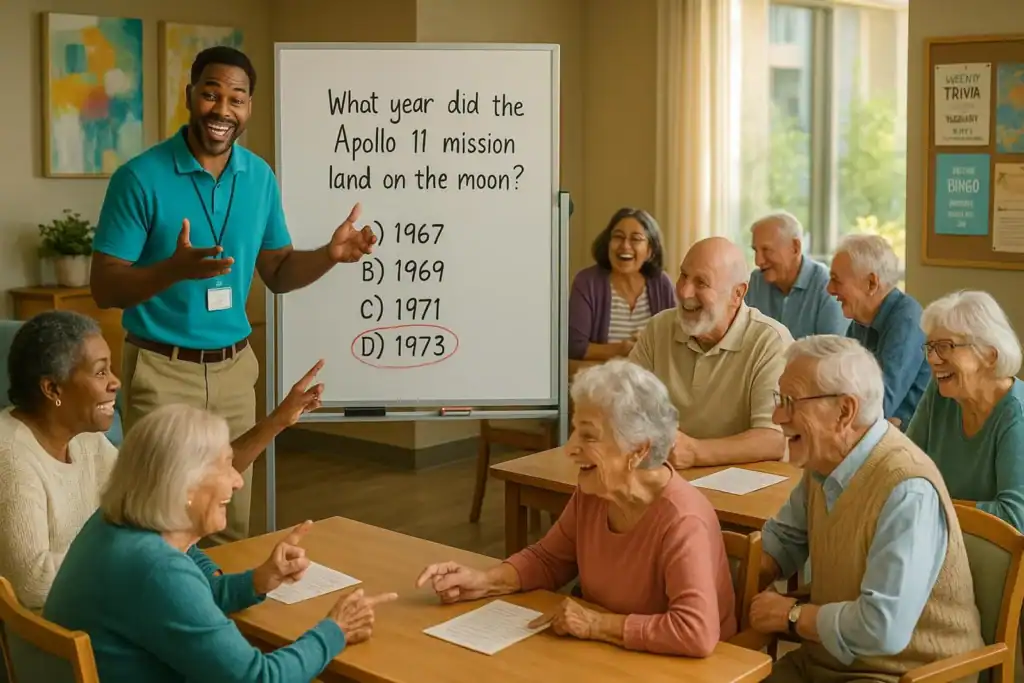
Tips for Choosing Suitable Trivia Questions
The foundation of a good trivia night is the question set. For seniors, pick topics that fit their lives: events from the 1940s-1970s, classic movies, popular music from their youth, and major moments they remember. Skip very niche or very current topics that could frustrate people.
Use a mix of easy, medium, and a few harder questions. Start easy to help players warm up and build confidence. For example, “What is the capital of Canada?” (Answer: Ottawa) is clear and direct. Keep wording simple so everyone understands. The goal is to spark memories and offer wins, not to stump the room.
Organizing Group versus Individual Play
Choosing team play or solo play changes the feel of the session. Teams often work well for seniors because they encourage cooperation, conversation, and lower pressure on any one person. Groups of 3-5 let people combine knowledge and support each other. This setup helps shy or unsure players join in without feeling singled out.
You can also add a short solo round for those who like a personal challenge. A mix of team and individual rounds can keep things lively. Explain the rules clearly at the start so the game runs smoothly.
Varying Difficulty Levels for Inclusivity
To keep everyone involved, be sure to vary difficulty. A good session moves from simple to more thoughtful questions. This way, people with different abilities and knowledge can all have success and take part.
For example, include “Who was the first person to walk on the moon?” (Answer: Neil Armstrong) along with a more detailed question like “What pivotal 1954 U.S. Supreme Court case declared racial segregation in public schools unconstitutional?” (Answer: Brown v. Board of Education). This mix keeps the game interesting and welcoming.
Making Sessions Fun with Themes and Prizes
Themes and small prizes can turn a regular game into a special event. Try themes like “Groovy Times” (60s-70s), “Classic Cinema,” or “Backyard Explorers” (nature). Simple decorations and background music that match the theme add to the mood and make the experience memorable.
Offer small, thoughtful prizes for extra motivation. They don’t need to be fancy-chocolates, small gift cards, or homemade treats work well. The goal is recognition and fun, not high value. Create a friendly space where people can relax, chat, and celebrate what they know.
What Are the Best Strategies for Trivia with Seniors with Dementia?
When planning trivia for seniors with dementia, adapt the approach to their needs. Focus less on winning and more on engagement, pleasant memories, and supportive social time.
Easy Questions and Familiar Topics
Keep questions simple and familiar. Choose topics rooted in long-term memory. Avoid complex questions or ones that rely on recent events. Instead, use well-known facts, common sayings, and earlier-life topics that bring up positive memories.
Examples include: “What is the largest mammal in the world?” (Answer: Blue whale) and “What type of tree do acorns come from?” (Answer: Oak tree). Historical prompts like “Who was the first president of the United States?” (Answer: George Washington) or music prompts like “Who was known as the ‘King of Rock and Roll’?'” (Answer: Elvis Presley) also work well. Aim for frequent success to lift mood and confidence.
Using Supportive Cues and Reminders
Caregivers and hosts can give gentle cues and reminders. This doesn’t mean giving away answers. It means offering small hints to help access memories. Multiple-choice options lower effort and raise the chance of a correct answer. If someone struggles, a clue or related fact can help connect ideas.
Visual aids like photos of famous people or objects, and audio clips of songs, can trigger memory. A “Who Am I?” format with gradual clues can also work well. The aim is a kind, helpful setting that leads to little wins, not stress.
Balancing Challenge with Enjoyment
Find a good middle ground between challenge and comfort. Mental activity helps, but not if it causes frustration. If questions are too hard, players may feel upset. If they’re too easy, they may lose interest. Look for questions that are engaging but allow regular success.
Watch reactions and adjust pace and difficulty as needed. Short sessions with breaks help keep energy and focus. The main goal is a positive, social experience that adds to well-being and joy.
Recommendations for Caregivers and Families Organizing Trivia
Running trivia for seniors, at home or in care, can be very rewarding. Plan ahead and focus on a warm, supportive setting.
Creating a Welcoming Environment
The space matters as much as the questions. A comfortable room invites people to join in. Arrange seats so people can talk easily. Good lighting helps those with low vision, and clear sound or a microphone helps those with hearing needs. These changes help everyone follow along and feel included.
Light snacks and drinks can make it feel like a social event. Encourage laughter and friendly talk, and take the pressure off getting every answer right. The main aim is enjoyment and connection.
Encouraging Participation and Group Bonding
Gentle encouragement helps, especially for quiet players. Present trivia as a team activity built on shared fun and memories. Ask teammates to discuss answers together to build trust and support. Celebrate correct answers, and offer kind words or hints when answers miss the mark. Move along at a steady pace.
For many seniors, especially in residential settings, these sessions may be a key social outlet. A positive, inclusive game can support well-being and a sense of community. Solving questions and reminiscing together can create strong bonds.
Combining Trivia with Other Activities
Keep things fresh by pairing trivia with other activities. A music round can lead to a sing-along. A history round can flow into a classic movie clip or a look through old photos. A nature theme can be followed by a short garden walk or a chat about local wildlife.
For those with dementia, mix trivia with crossword puzzles, board games, or art projects. Keeping Busy games, made for seniors with dementia, offer puzzles and memory games that fit well with trivia. This varied plan helps keep people engaged and offers different ways to think and connect.
Trivia Resources and Sample Questions for Seniors
Good questions can make or break a session. There are many sources online and in print to help you build a great quiz.
Printable and Online Trivia Question Sources
Many sites offer free and paid trivia questions made for seniors. YourLifeChoices has a daily seniors trivia quiz with topics like General Knowledge, Dictionary, Entertainment, History, Food & Drink, Geography, and Science & Nature. Questions range from easy to hard. These quizzes are simple to access, no download or sign-up needed, and work for solo or group play. They also include extra info about each answer, turning each result into a learning moment.
Other options, like The Game Room and Integrated Arts for the Ages, provide printable sets by decade or theme and tips for hosting. These are handy for caregivers and activity leaders who want ready-to-use materials. Pick sources with clear, readable questions and a mix of topics that fit older adults.
Sample Questions by Decade and Theme
Here are sample questions by popular decades and themes to spark memories and lively talk:
Decades-Based Trivia:
- 1940s:
- Who was the President of the United States at the end of World War II? (Answer: Harry S. Truman)
- Which crooner released the hit song “White Christmas” in 1942? (Answer: Bing Crosby)
- What significant event happened on June 6, 1944? (Answer: D-Day, the Allied invasion of Normandy)
- Which animated film released in 1941 by Disney features a flying elephant? (Answer: Dumbo)
- 1950s:
- What famous toy was introduced in 1959 and became a cultural icon? (Answer: Barbie Doll)
- Who was the host of the 1950s variety show The Ed Sullivan Show? (Answer: Ed Sullivan)
- Which 1950s sitcom featured the characters Ralph and Alice Kramden? (Answer: “The Honeymooners”)
- What popular television game show debuted in 1956, hosted by Bob Barker? (Answer: “The Price Is Right”)
- 1960s:
- What 1969 music festival is often considered the defining moment of the counterculture movement? (Answer: Woodstock)
- Who was the first person to walk on the moon in 1969? (Answer: Neil Armstrong)
- Which British band became a worldwide phenomenon in the 1960s? (Answer: The Beatles)
- Which movie released in 1965 starred Julie Andrews as a singing nun? (Answer: The Sound of Music)
- 1970s:
- Which band released the album “Rumours” in 1977? (Answer: Fleetwood Mac)
- Which 1975 film directed by Steven Spielberg is considered the first major summer blockbuster? (Answer: Jaws)
- Who was known as the “King of Pop” and released the album “Off the Wall” in 1979? (Answer: Michael Jackson)
- Which song by The Eagles was released in 1977 and became one of their biggest hits? (Answer: “Hotel California”)
Classic Movies & TV:
- What famous line is spoken by Humphrey Bogart’s character to Ingrid Bergman’s character in Casablanca? (Answer: “Here’s looking at you, kid.”)
- Who played the role of Atticus Finch in the 1962 film To Kill a Mockingbird? (Answer: Gregory Peck)
- What TV series featured the fictional town of Mayberry? (Answer: The Andy Griffith Show)
- Which 1960s TV show featured a talking horse? (Answer: Mister Ed)
Music & Musicians:
- Who was known as the King of Rock and Roll? (Answer: Elvis Presley)
- Which band is famous for the song “Hey Jude?” (Answer: The Beatles)
- Who was the lead singer of The Rolling Stones in the 1960s? (Answer: Mick Jagger)
- Who first sang the song “Stand By Me,” in 1961? (Answer: Ben E. King)
Science & Nature:
- What is the chemical symbol for the element gold? (Answer: Au)
- Which planet has the most moons in our solar system? (Answer: Saturn)
- What is the largest living species of bird? (Answer: Ostrich)
- What is the largest ocean on Earth? (Answer: The Pacific Ocean)
These samples show how varied and fun trivia can be, blending nostalgia with a friendly mental workout.






































